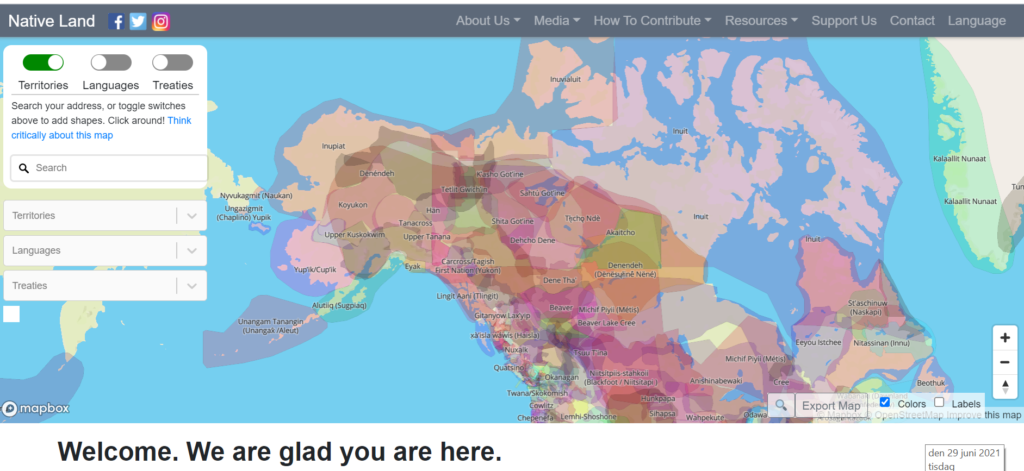
The 150th Canada Day happened in 2017. Everyone could get a free Parks Canada pass and there were celebration events held all over the country. I think it had been planed for a few years to be a federal-funding-intensive year-long Canada-ra-ra, but by the time it rolled around it was hard to feel very Canada-ra-ra. The Truth and Reconciliation Commission report came out in 2015, and by summer 2017 everyone had time to read the Calls to Action and also some of the personal testimonies. Who had the stomach for flag-waving, outdoor fireworks, and a barenaked ladies concert?
This feeling of somber reflection RE: the Canadian colonial experiment persisted, and has lately increased with the much-needed reporting on atrocities of the past and the continued/current scenario for Indigenous folk in Canada. It has been a tough year for all, but imagine topping this off with physical evidence that one’s family members were disappeared. (I say physical evidence because many oral reports have been available for ages, so while this wasn’t a shocking surprise, being confronted with the details of it leaves a very heavy-hearted feeling about the place called Canada, and Canada’s birthday.) I say this as someone who has in the past gone to public Canada ceremonies to sing O Canada in English and en français and represented Canada in a sporting context on the National Team.
GI Joe says knowing is half the battle, and (just going with that for a moment), maybe reaching a large critical mass of Canadian-settlers who know and really understand the full scope of Canada’s colonial crimes will help in the smallest way. I learned about residential schools from my maternal Grandparents; my Nana came to Canada as a ‘displaced person’ (i.e. refugee) and did not hold back in her critique of residential school as a deeply shitty policy. “What do you think it would be like to be taken from your parents and whisked far away and you couldn’t see them for months, or longer?” As a mother of 6 I think she really felt for parents losing their kids. My Grandfather was (as usual) not as talkative; I wish I could talk to him about it now and get his perspective. Much later I realized residential schools weren’t historic events like WWII internment camps; the last one closed as I was finishing up high school. Even later I realized most settler folk didn’t know much, or anything, about the schools. What a tremendous gap in understanding this has left, and a lack of empathy along with it. If knowing = understanding = empathy, then awareness is worth working towards for those stragglers trying to minimize, make excuses, or shrug off responsibility.
If knowing is half the battle, the other half needs to be action. Indigenous people deserve truth and acknowledgement of the full extent of crimes against them, a whole-hearted apology from all involved, and meaningful compensation. Every settler person in Canada (and us abroad!) should also want this and work for this, and be committed to shaping a Canada that is just, so we can all feel at peace to sleep at night. Flag-waving can wait a bit.
‘Nation-building’ is an ongoing process, and we need some renovations. Wondering what you can do? A USask colleague forwarded this list to me, so I’ll post it here so your consideration.
Support for survivors and their families is available. Call the Indian Residential School Survivors Society at 1-800-721-0066 or 1-866-925-4419 for the 24-7 crisis line. The KUU-US Crisis Line Society also offers 24-7 support at 250-723-4050 for adults, 250-723-2040 for youth, or toll-free at 1-800-588-8717.
- Learn about the residential school system and its ongoing impact
- Review the Truth and Reconciliation Act
- Have discussions with your family and friends
- Follow Indigenous authors
- Listen to survivors and their families
- Avoid requesting Indigenous peoples to provide emotional labour
- Donate to organizations that support survivors and their families
- The Indian Residential Schools Survivors Society
- The Orange Shirt Society
- Indigenous led child welfare organizations
- Language revitalization, cultural and land based programs
- Indigenous led community organizations, such as First Nations Child and Family Caring Society
- Contact your MP and other elected representatives and insist they take action
- Ask that perpetrators be held accountable for their actions
- Demand a comprehensive search for unmarked graves for ALL residential schools
- Demand that all residential schools be protected and funded as heritage memorial sites in accordance to the wishes of First Nations communities
- Demand action to end ongoing colonial violence against Indigenous children
- Demand action on the over-representation of Indigenous children in the child welfare system
- Prioritize safety of survivors and their families when sharing these stories.
- Understand many Indigenous peoples are traumatized right now
- Avoid asking survivors to share their stories, unless otherwise indicated. Survivors will let you know who is available to speak
- Provide content warnings
- Demand action from the Catholic Church
- Demand an apology from the Pope and the Catholic Church
- Demand lands owned by the church be returned back to Indigenous communities and people
- Have discussions within your church communities

Updated on July 2:
“It’s a day of reflection, in many ways a day of protest. Canada can’t be at peace with itself, unless it comes to peace and harmony with Indigenous governments, as was intended with the signing of the treaties,” said Chief Dennis Meeches.
https://www.cbc.ca/news/canada/manitoba/canada-day-orange-shirts-residential-schools-manitoba-1.6087352